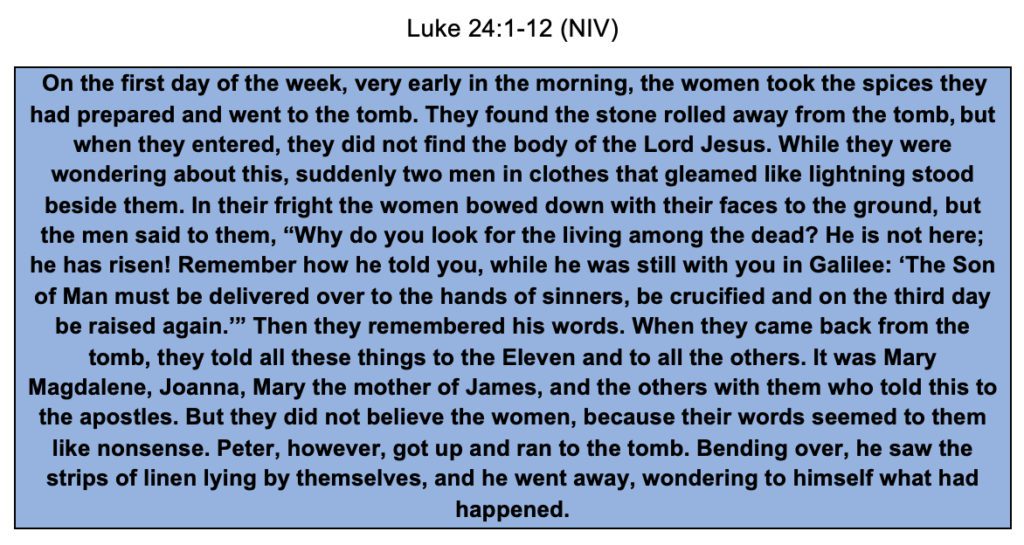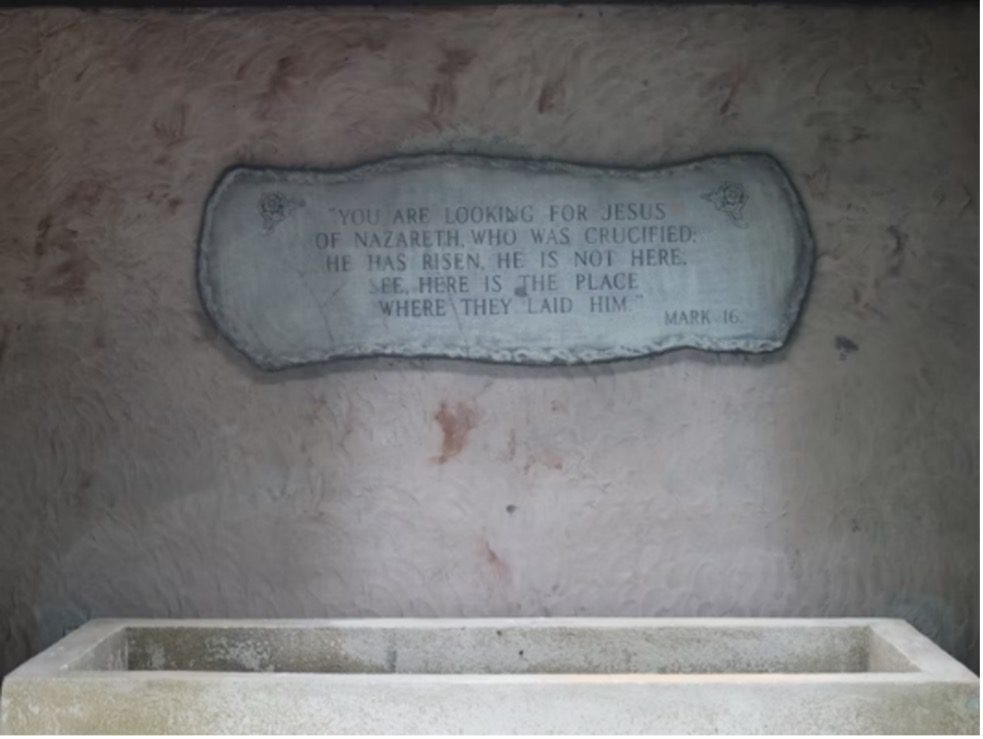
People thought it nonsense that Jesus would rise from the dead. How could a mere mortal die and then suddenly rise from the dead? But Jesus wasn’t a mere mortal. Jesus was and is the Son of God. The Messiah. The angel said it, “Why do you look for the living among the dead? He is not here; he has risen! Remember how he told you, while he was still with you in Galilee: ‘The Son of Man must be delivered over to the hands of sinners, be crucified and on the third day be raised again.’” It is a fact. For those of us who believe, we know it to be true and we know that He will come again.
The beauty of that is you don’t have to believe it. God doesn’t make you believe it. It’s a choice. God gives you the choice to believe or not to believe. This I know. If you choose not to believe I say to you, “What if you’re wrong?”
When the women told the men Jesus had risen, they were skeptical even though Jesus told them He would. I’m sure they thought to themselves: No one rises from the dead. Maybe he really wasn’t dead. I’ve often wondered why any of the disciples would ever doubt for a second that Jesus had risen. They followed Him for three years. Saw Him perform miracles. Heard Him preach and teach the Kingdom of God. Saw Him nailed to a cross knowing what that kind of torture meant. Saw Him die. I don’t know but I’m thinking if I saw all that I would have known. I would have believed every word the women said.
Enter 1965, The Passover Plot a book by Hugh J. Schonfield. There are those among us who believe the premise of this book. Schonfield was a liberal Hebrew Christian born in London on May 17, 1901. Died in London on January 24, 1988. Supposedly a British Bible scholar. His claim to fame being he specialized in the New Testament. The early development of the church and the Christian religion itself also appeared on his list. Among one of the founders of the pacifist organization known as the Commonwealth of World Citizens “Mond Civitan Republic, Schonfield found himself excluded from membership of the International Hebrew Christian Alliance in 1937. He’d been a founding member of this organization since 1925. The reason for his exclusion was reportedly based on his unwillingness to affirm the deity of Jesus Christ.
The Passover Plot came about from Schonfield’s research of the Gospels. Specifically during the time of Jesus’ birth, life, and death. In a nutshell, he concluded that Jesus was this deeply religious Jewish guy who knew a lot about the teachings of the Nazarenes and Essenes. He became rebellious toward and a thorn in the side of the Sadducees of the Temple in Jerusalem. Additionally, the Jewish people were anxiously awaiting the Messiah. They’d been under the thumb of the Romans. This guy, Jesus, lived (H)his religion out in his daily life and became convinced of (H)his role as the expected Messiah. You know where this is going, right?
Due to Jesus’ belief (H)he consciously and methodically with calculating precision attempted to fulfill the role of Messiah, also knowing what all of this entailed. He knew (H)he must play it out perfectly. If (H)he didn’t meet the expectations (H)he’d be declared a false Messiah. Schonfield also contends that Jesus knew the consequences of (H)his actions the entire time and brought (H)his original twelve Apostles who (by the way) knew nothing of Jesus’ plans, to help (H)him carry them out. The fewer that knew the plan the better. And even then, knowing as little information as possible.
The total of Jesus’ plan according to Schonfield, included (H)his crucifixion (in other words (H)his death), (H)his resurrection, and then (H)his reign not only as a true king but as a priestly Messiah. Only not in heaven—on earth. Schonfield points to the Gospel of John and concludes that John had it right in that Jesus planned everything. But that it most likely was filtered through an assistant and transcription since John was rather old at the time of his writings. In essence, John knew Jesus wasn’t the Messiah but went along with it and didn’t report the entire truth. Hence Schonfield’s mention of the story being filtered during transcription.
Here’s the plot according to Schonfield: Jesus planned not to be on the cross for more than a few hours before the Sabbath arrived. The reason: according to law Jews had to be taken down before the Sabbath began. One of Jesus’ supporters would give (H)him water laced with a drug to cause (H)him to become unconscious. Joseph would take Jesus down from the cross while still alive (but everyone thinks Jesus is dead) and secretly nurse (H)him back to health. Are you with me so far or is your head beginning to hurt?
Wouldn’t you know, according to Schonfield the plan went off the rails when the soldier pierced Jesus with his spear and the plan had to be altered. Schonfield also goes so far as to conclude that possibly John and Joseph of Arimathea were most likely responsible for the events following the Crucifixion. Additionally, an undercover Disciple known to no one was the one seen at the Tomb on the morning of the Resurrection, not an angel. Jesus supposedly made sure (H)he didn’t die. Plus, and this is the part that amazes me, Jesus, this mortal man put (H)himself out there as the Son of God—the Messiah—to be beaten unmercifully and crucified which included (H)his willingness to endure nails being driven into his hands and feet. So, that’s it! But it doesn’t explain what the disciples did later. Does this explanation of the life, death, and resurrection of Jesus leave you with that feel-good feeling you get from a happy ending? I, for one, say no. Might I add…I ain’t buying it.
Remember the movie The Natural about a baseball player by the name of Roy Hobbs? This is another one of those let-down endings because in the novel you’re left with him striking out. Say it isn’t so, Roy! The movie, however, offers its viewers a different ending. A happy ending that leaves you with goosebumps. Hobbs hits it out of the park with the ball hitting the lights and sparks flying everywhere. It’s glorious!
We all want that happy ending, don’t we? If you look at the likes of Schonfield believing that the Biblical writers changed the scene as a coverup, well, you’ll forgive me if I have no words for you. But then, the disciples even doubted it until Jesus appeared to them. Five hundred times to be exact. One simply can’t explain the passion and enthusiasm of the disciples if it didn’t happen. Peter was crucified upside down for proclaiming it. They went out telling the good news of the resurrection of Jesus at peril to their own lives.
We really can’t explain the resurrection. As believers, we just know. Our faith in Jesus Christ as the Son of God assures us it happened. Because of that faith, because of that belief, it changes everything. It changes the past. We carry the scars of Good Friday from the past. A love that will not die transforms the past. The power of the resurrection abides in us if we believe.
From the resurrection, the future becomes transformed. Do some fear it? Is that why some may doubt? I know in these uncertain times I fear for my kids and grandkids. Not for their souls because I know they love the Lord. But for the struggles they will have in a world that’s upside down. I don’t know what will happen. What I do know is that the same God who raised Jesus from the dead has a place for us. That’s our future.
No one knows what the future holds but Romans Chapter 8 verses 1-4 (NIV) tells us: “Therefore, there is now no condemnation for those who are in Christ Jesus because through Christ Jesus the law of the Spirit who gives life has set you free from the law of sin and death. For what the law was powerless to do because it was weakened by the flesh, God did by sending His own Son in the likeness of sinful flesh to be a sin offering. And so He condemned sin in the flesh so that the righteous requirement of the law might be fully met in us, who do not live according to the flesh but according to the Spirit.” There you have it. Jesus gave His life to set us free.
What can separate us from God’s love? Nothing! So why would we live in fear? We have security after we die. God is at work to raise us up. He is the God of the resurrection. God walks with us through every segment of our life. He’s there in good times laughing and celebrating with us. He’s there in bad times crying with us. He takes our trials and destroys them. “For those who are led by the Spirit of God are the children of God.” Romans 8:14 (NIV)
As I write this, we are in the Lenten Season walking toward the resurrection. Getting excited about it. We have the opportunity each day to proclaim it. No fear. To that I say, rise up as people of faith. Rise up with deeds and words. Make a difference.
Remembering that Easter changes everything.

And that’s what I learned in Church……see ya next time!